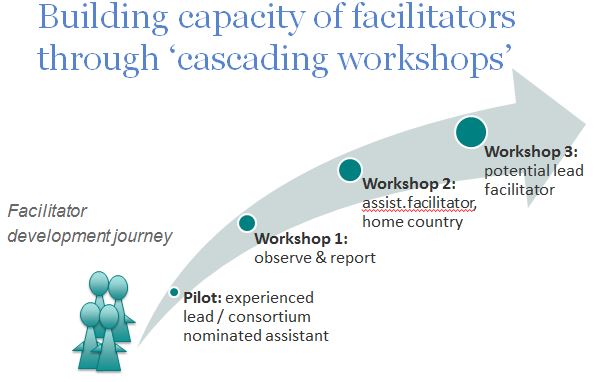Reflections on Information Literacy Training Strategies at LILAC Conference
INASP’s Emma Farrow used her presentation at the 2015 LILAC conference to reflect on INASP’s new approach to Information Literacy (IL) training and how the organization focuses on building institutional skills for long-term information needs.
LILAC, the Librarian’s Information Literacy Annual Conference, is a well-respected annual information literacy conference. Organized by the UK Chartered Institute of Library and Information Professionals (CILIP) Information Literacy Group, it is attended by delegates from over 30 countries: from schools, government, higher and further education, health and special libraries. LILAC defines Information Literacy as the ”ability to find, use, evaluate and communicate information”, viewing it as “the cornerstone of learning and an essential skill in this digital age.”
Emma described INASP’s longer-term approach to IL training within the five-year programme, Strengthening Knowledge and Research Systems (SRKS). A key objective of SRKS is to strengthen the capacity of library consortia and member institutions in INASP’s partner countries to secure and manage access to the online research literature that their researchers and students need. IL training for library staff plays an important role in achieving this objective, training the trainers so that skills can be built within institutions.
New and revised workshops for librarians within SRKS include IL Strategy, IL into Curriculum and Pedagogical Skills. All of these enable participants, and participating institutions, to develop and deliver their own Information Literacy training according to their needs.
In Brief: how we do it
Training has been made more localized, new materials are easy to contextualize for different countries. INASP’s continuing assessment of outcomes and quality means that we are able to learn and adapt, improving the materials. Workshops are delivered by local and regional facilitators rather than flying in trainers from elsewhere.
The ‘cascading workshop’ approach maximizes facilitators’ skills development and the spread of those skills, embedding them in institutions.
An increased emphasis on participant selection, and the use of pre- and post-assessment tools informs facilitators and can be used to assess effectiveness of the workshops.
Integrated post-workshop tasks (collectively agreed with participants) are then followed up six months after the training.
These steps allow for flexibility and relevance of training materials, as well as enabling INASP to learn and adapt more quickly, resulting in more effective programming and materials.
This approach is about working with consortium partners to determine their long-term needs, then equipping them with the skills and the tools to meet those needs. It is designed to build genuine and enduring capacity in Information Literacy within INASP partner organizations.
Slides from Emma’s presentation can be viewed here. To follow the most recent IL training workshop in El Salvador please follow us on Twitter or use the hashtag #inaspLAM.





